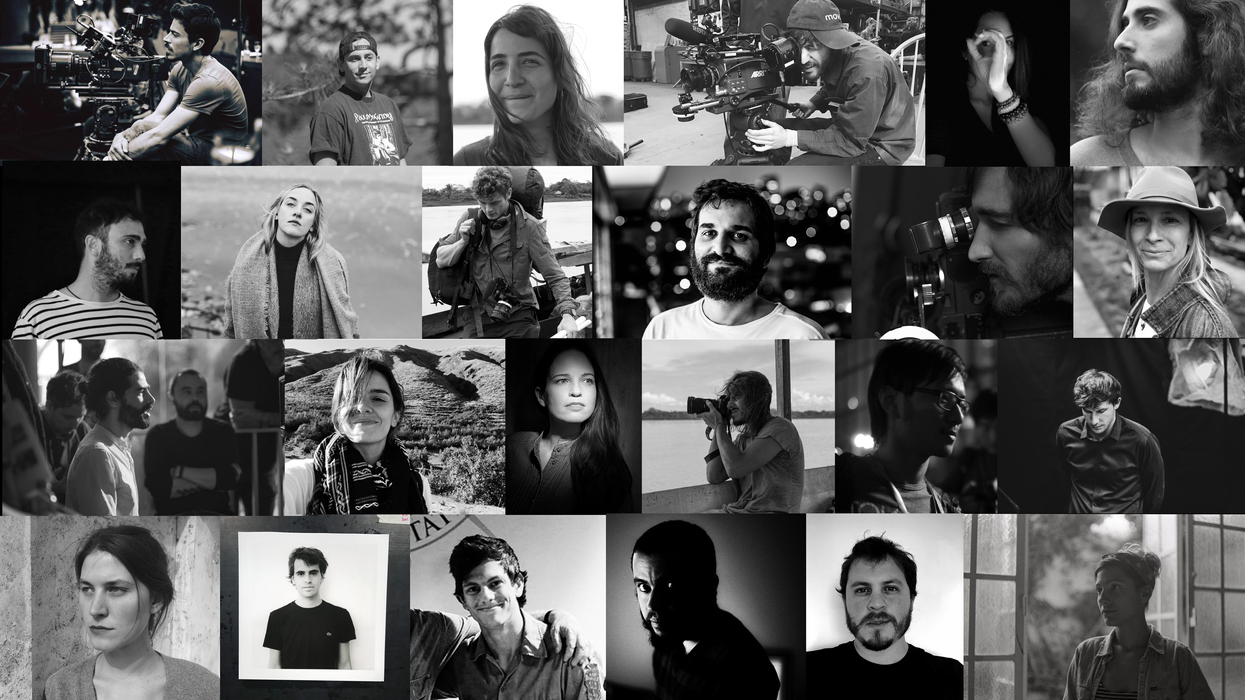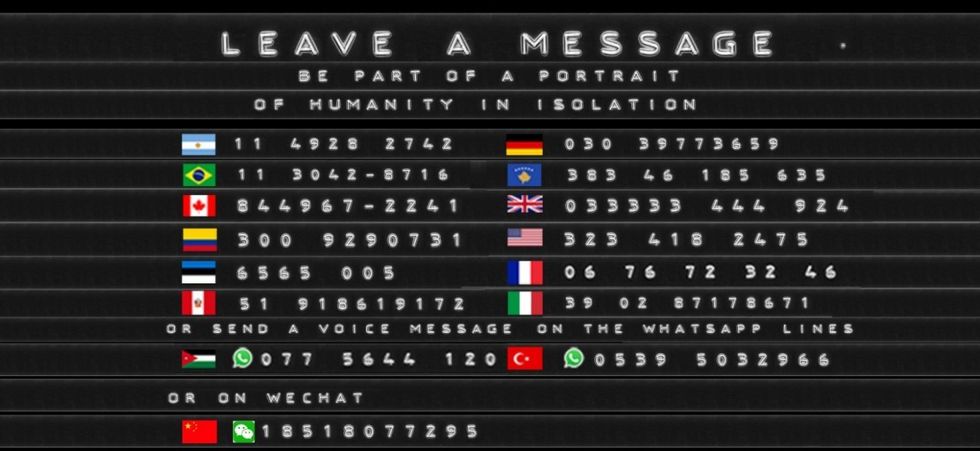24 Directors From 15 Countries Team Up for 'Tell Me', A Portrait of Humanity in Isolation
Leave a message after the tone.

[Editor's Note: This post was written by Rupert Clague and Micah Van Hove.]
We’re living in a time in which people are feeling so much, but have so few outlets to express it. All over the world, people find themselves isolated, overwhelmed, lonely, or afraid; forced into close quarters with partners, kids, strangers, or on their own.
In an effort to collect these thoughts and feelings, we've set up a series of voicemail boxes around the world. Over the past 2 months, we’ve been encouraging people to call and leave messages with anything they might be feeling during the COVID-19 pandemic. These messages are to be brought together in a documentary film entitled Tell Me: a portrait of humanity in isolation.
Tell Me brings together voices from Argentina, Brazil, Canada, China, Colombia, Estonia, France, Germany, Italy, Jordan, Kosovo, Peru, Turkey, the UK, and the US. All of the filmmakers met for the first time 2 years ago in a remote part of the Peruvian Amazon, having been invited by Werner Herzog to attend his filmmaking workshop. Feeling restless and alone, we banded together to find our own creative response to the crisis. But the origins of Tell Me concept begin in Japan:
In a COVID-dominated world, filmmakers have been relegated to their homes. We wanted to try to make something that could take us out of our creative lockdown and provide a shared experience. We all know that film can tell stories that transcend international boundaries and proffer commonality across all manner of divides. When the screen lights up we are invited to inhabit an emotional landscape, and no matter what the film, leave feeling different from how we came in.
We want the Tell Me voicemail boxes to provide a similar respite—a space (after the beep) for proclamations, laments, sweet nothings, odes, stories, poems, songs, screams, sighs, or anything else people might want to get off their chest in these strange times. It is a space for anything people want to be free from or just something that needs to be heard.
One by one, we began to set up numbers, country by country. This was not without its practical challenges. Moreover, once the lines were established, we quickly realized that in some countries, people aren’t accustomed to declaring their feelings to anyone—let alone a stranger—while in others, like Jordan, the culture of voicemails doesn’t really exist. No fear.
Having figured out workaround solutions, we began to think of ways to get our platform out there and to encourage people to call. Each one of us acted as our own press unit, whether it was putting up posters, reaching out to journalists (from local papers in London and France), doing radio interviews in Argentina, bombarding people with Instagram stories… we adhered to our mentor Werner Herzog’s maxim: “guerilla tactics are best”.
Here’s how we approached things in Germany:
While the voicemails are the basis for the film, we are navigating shooting scenarios in which audio and visual hold equal weight. Each chapter will be shot by a director residing in the corresponding country, or if restrictions get in the way, will be shot remotely by a director of the same nationality.
Each week we’ve held discussions about visual references, what we’re watching, listening to, and reading, but ultimately each person is in charge of their own 7 to 10-minute chapter, and deputized to give visual life to their own phone calls.
We hope this approach will combine each of our own individualities as filmmakers: our own cultures, views, and locations will be imbued in our respective kinesthetics. Each of us will find a way to show how isolation has cast a shadow on our own countries: not as reportage, but as cinema.
...A space (after the beep) for proclamations, laments, sweet nothings, odes, stories, poems, songs, screams, sighs, or anything else...
The voicemails we’ve heard so far are a rich tapestry of experience and demonstrate how every single person has been impacted differently. We’ve had messages from people who haven’t spoken to anyone in weeks; from parents driven mad trying to homeschool their children; from medical personnel on the frontline; people unable to attend funerals of loved ones; people who have discovered positive, revelatory things out about themselves; people searching for meaning; from those who are afraid, in love, excited or at peace; the inspired, the encouraged, hopeful, exasperated, cranky, disgusted, and apathetic alike.
We hope this opportunity gives some freedom to share what they are feeling at a time unlike any we have ever experienced. The voicemail space provides an opportunity for you to speak your mind as if sharing a secret with a total stranger, a taxi driver, a bartender in a foreign city—someone you may never see again.
We want to show the multitude of human experiences as we go through the same situation, and that many parallel realities that simultaneously exist side-by-side in each country, each city, each home, each room. The more we’ve listened to these messages, the more we’ve become enamored by their peculiar power, and the narrative space after the tone.
Though we may have lost sight of ourselves and those beside us in the darkness of COVID-19, we believe the cinema remains an indisputably social institution. Over the course of the film, we may share laughs with strangers, or feel moments of tension amongst us. The philosopher Ian Jarvie suggests cinemas "create an invisible community grouping: those who have experience and share exposure to the same content." He goes on to say we live in “a society of audiences. We are all members of audiences many times a day to different media, at different places, in different contexts. We are radio and newspaper audiences in the morning. Hoardings audiences while we travel to work. Radio, television, gramophone, film, theatre, and book audiences in the evening. [...] Most communications of any kind, even face to face, involve transmitter and receiver: source, medium, and audience.”
Films and voice messages alike help us to organize our world—each is a moment to think about our lives and how we relate to those around us. This space is a meeting place for ideas, these collective narratives an essential component of our cultural identity, to feeling as though we are part of something bigger than ourselves. Accordingly, Tell Meseeks to bring disparate voices together as one.
Feel free to call Tell Me and leave a piece of yourself, or simply pass it along.
Argentina: Kevin Zayat / Lucia Valdemoros / Gerónimo Tanoira / Natu Trzcina / Agustin Barrutia / Pablo Radice / Fermin Pedros Canada: Brett Pedersen Brazil: Tom Hamburger / Joao Carol Cuoto / Rodrigo Baptista China: Shen Wei Colombia: Sebastian Lopez-Borda Estonia:Marta Pulk France: Quentin Lazzarotto Germany: Sonja Ortiz Jordan: Tanya Marar Kosovo: Norika Sefa Peru: Cesar Malaga UK:Rupert Clague USA: Micah Van Hove / Ashely Mosher / Caleb Spaw












